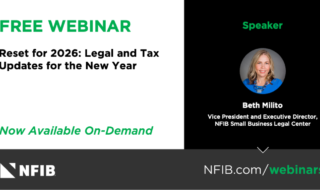Financing Your Small Business: Understanding Business Loans and Other Financing Strategies
Financing Your Small Business: Understanding Business Loans and Other Financing Strategies
November 14, 2025
Securing funding to finance your small business can feel overwhelming, but having a basic understanding of your options and available resources will help with choosing a strategy that fits your business needs. Below is an overview of business loan options and other financing opportunities that may be suitable for your business.
Small Business Loans
The first step in deciding to apply for a loan is to review and compare available options to find a loan that is best suited for supporting your business needs. SBA loans are government-backed loans with more favorable terms, such as lower interest rates and smaller down payments. Eligibility is based on factors such as income generation, ability to repay the loan, credit history, a sound business plan, where the business operates, and the ability to meet SBA size requirements.
Commercial loans, on the other hand, do not receive government backing and are financed directly by lenders, such as banks or credit unions. In general, commercial loans offer more flexibility and quicker access to financing. Established businesses have a better chance of qualifying due to stricter eligibility requirements, such as a strong credit history, a solid business plan, and a proven history of cash flow. Commercial loans typically have shorter repayment terms, larger down payments, and variable interest rates. Contacting a lender where you have a personal or business banking relationship will be the first step in determining whether a commercial loan is right for your business.
SBA Loans
| Loan Type | Maximum Loan Amount | Loan Servicer | Examples of Allowable Uses | Conditions of Eligibility |
|---|---|---|---|---|
|
Loan Type
7(a) Loan
|
Maximum Loan Amount
$5 million
|
Loan Servicer
Traditional Lenders (i.e. banks, credit unions, and other financial institutions)
|
Examples of Allowable Uses
Acquiring, refinancing, or improving real estate; working capital; refinancing debt; purchasing machinery, equipment, furniture, and supplies; changes in ownership; and multi-purpose loans
|
Conditions of Eligibility
Must be a for-profit business operating in the U.S.; meets SBA size standards; is not an ineligible business; is creditworthy; and is
unable to obtain a loan by other means
|
|
Loan Type
504 Loan
|
Maximum Loan Amount
$5 million
|
Loan Servicer
Certified Development Companies (CDCs)
|
Examples of Allowable Uses
Purchasing or construction of buildings, land, new facilities, machinery, or equipment; improving land, streets, utilities, and facilities; and repaying or refinancing “qualified debt”
|
Conditions of Eligibility
Must be a for-profit business operating in the U.S.; have a tangible net worth less than $20 million and an average net income of less than $6.5 million; and meets SBA size standards
|
|
Loan Type
Microloan
|
Maximum Loan Amount
$50,000
|
Loan Servicer
Designated Intermediary Lenders
|
Examples of Allowable Uses
Can be used as working capital and for acquiring inventory, supplies, furniture, fixtures, machinery, or equipment.
*Microloans CANNOT be used to help pay off existing debts or to purchase real estate*
|
Conditions of Eligibility
Each intermediary lender has its own eligibility requirements, but most require some form of collateral and personal guarantee from the business owner.
|
Additional SBA Resources
7(a) Loans
About the 7(a) Loan Program
SBA Lender Match Tool
SBA Size Standards
13 CFR 120.110: Ineligible Businesses
504 Loans
About SBA 504 Loan Program
SBA List of CDCs
.
13 CFR 120.882: Eligible Project Costs for 504 Loans
Microloans
Small Business Investment Companies
The SBA also licenses and regulates Small Business Investment Companies (SBICs). SBICs leverage SBA guaranteed funds in addition to private financing to invest in small businesses in various sectors and industries. They are restricted from investing in businesses that deal in real estate, gambling, and banking. SBICs provide loans ranging from $250,000 to $10 million with interest rates between 9% and 16%. They also invest in businesses in exchange for ownership in the company, with investments ranging from $100,000 to $5 million.
Debt Financing vs. Equity Financing vs. Grants
Debt financing is funding that is borrowed and must be repaid, usually with interest. Common forms of debt financing include loans and lines of credit. While debt financing involves repayment obligations tied to interest, you maintain complete ownership of the business and all future profits. Lenders often require loans to be backed by collateral, which they can take if the business fails to make payments. In some cases, business owners may face legal action for nonpayment. Another consideration is that funding availability often depends on how established a business is. More mature or well-established businesses typically find it easier to access and secure debt financing.
Equity financing is funding given in exchange for partial ownership of the business and future profits generated from the business. Common sources of equity financing include family, friends, business acquaintances, and venture capital (the latter being much more difficult to obtain). A positive aspect of equity financing is that there is no repayment required; however, it involves diluting ownership and future profits and could lead to disagreements between partners on business goals and objectives.
Grants and scholarships are funding options that do not need to be repaid and do not impact business ownership. This type of funding may be offered by government agencies, nonprofits, or foundations, but is often competitive and industry-specific. Beware of “free money” claims, as they as likely scams.
Practical Tips
- Start locally by checking your county or city’s department of economic development for loan and grant programs.
- For commercial loans, start by contacting a lender where you have a personal or business banking relationship.
- Determine the amount of funding needed; this helps potential lenders assess risk and builds trust.
- Have a clear use for the funds in mind and outlined in your business plan. This will help determine the right type of funding for your business and help with finding a suitable lender.
- Demonstrate your ability to repay the loan by providing relevant and accurate documentation and making on-time payments.
- A list of loans, small business grants, and programs for small business can be found here: Grants, Loans, and Programs to Benefit Your Small Business
Have additional questions about small business financing? Reach out to NFIB’s Legal Center for help at info@nfib.org.
NFIB is a member-driven organization advocating on behalf of small and independent businesses nationwide.
Related Articles













